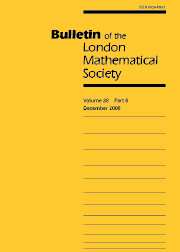Article contents
LATIN SQUARES AND THE HALL–PAIGE CONJECTURE
Published online by Cambridge University Press: 20 March 2003
Abstract
The Hall–Paige conjecture deals with conditions under which a finite group $G$ will possess a complete mapping, or equivalently a Latin square based on the Cayley table of $G$ will possess a transversal. Two necessary conditions are known to be: (i) that the Sylow 2-subgroups of $G$ are trivial or non-cyclic, and (ii) that there is some ordering of the elements of $G$ which yields a trivial product. These two conditions are known to be equivalent, but the first direct, elementary proof that (i) implies (ii) is given here.
It is also shown that the Hall–Paige conjecture implies the existence of a duplex in every group table, thereby proving a special case of Rodney's conjecture that every Latin square contains a duplex. A duplex is a ‘double transversal’, that is, a set of $2n$ entries in a Latin square of order $n$ such that each row, column and symbol is represented exactly twice.
- Type
- NOTES AND PAPERS
- Information
- Copyright
- © The London Mathematical Society 2003
- 5
- Cited by


